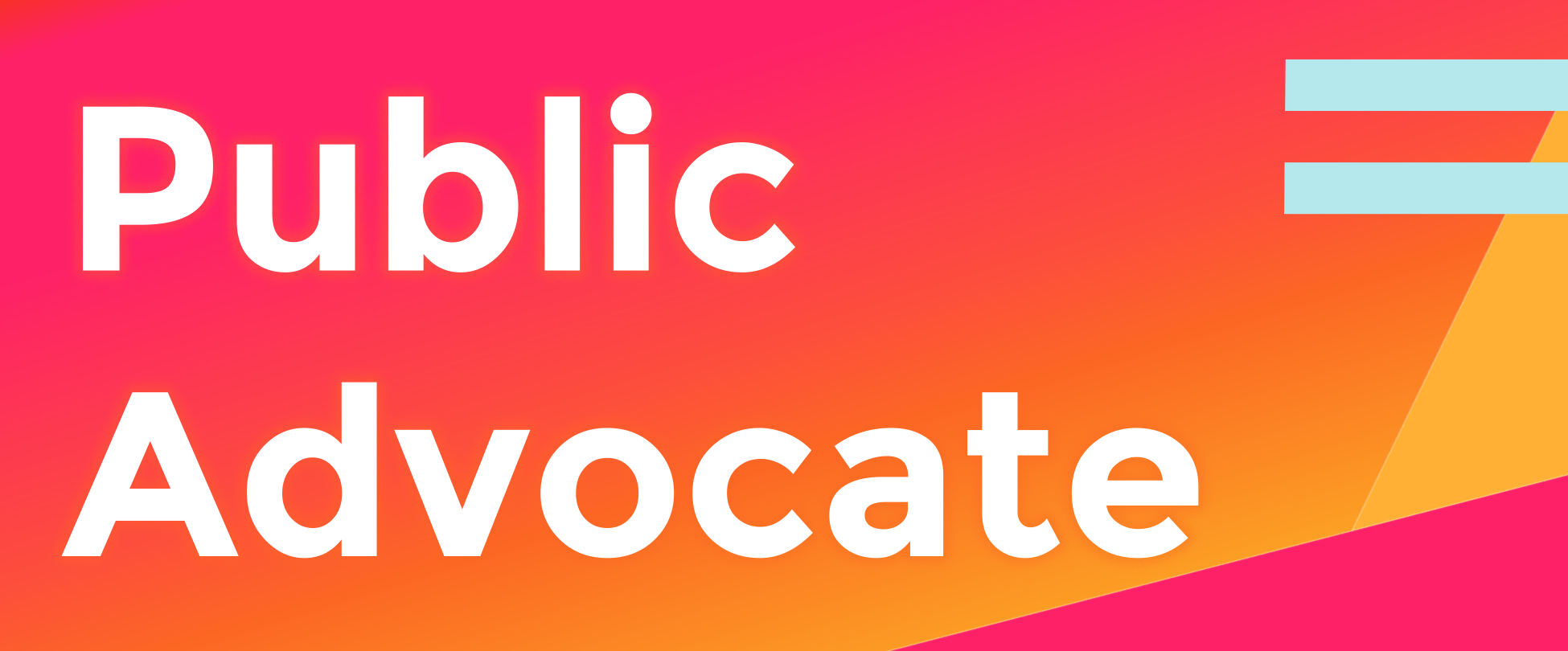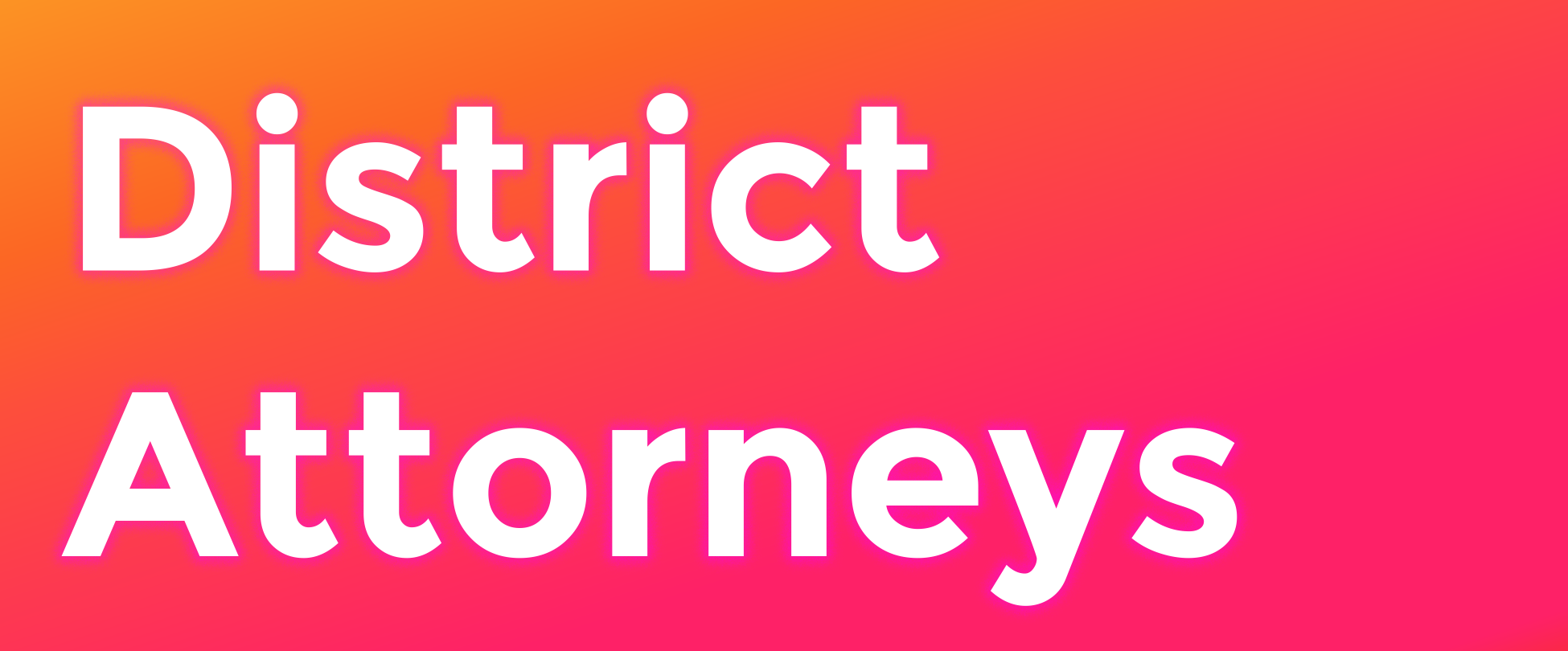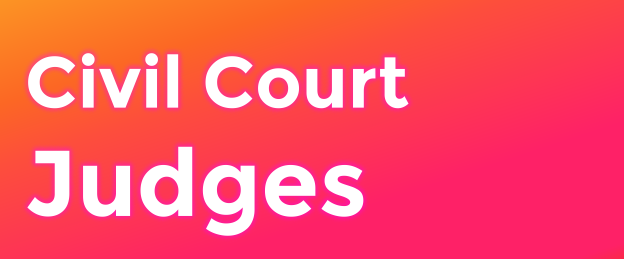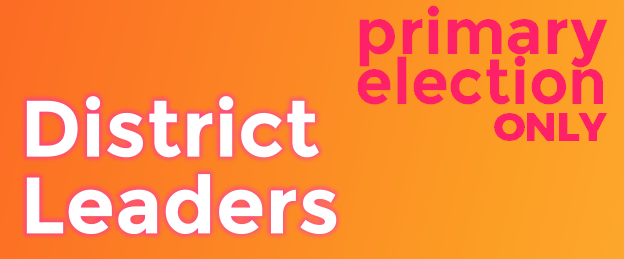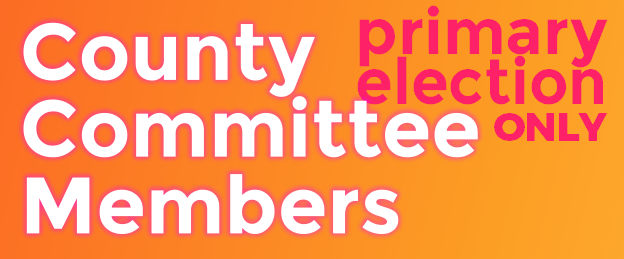Job Descriptions of Officials up for Election in NYC 2017
So you’re headed to the polls and not even sure what the elected officials do… We’ve got you covered!
On every office’s landing page, we post job descriptions to give context to your vote. Click on any office you want to see to expand the job description, then visit the page for even more info!
NYC Mayor
The Mayor is NYC’s chief executive officer, responsible for running city government and its operations effectively and with integrity.
The NYC Mayor establishes and maintains citywide policies, together with the other branches of city government. The Mayor oversees many departments of NYC government, and is the boss of the city’s workforce of over 360,000 employees.
Powers and Responsibilities
click for more details!
Manages the Office of the Mayor
- Creates and abolishes bureaus and divisions within the Mayor’s Office.
- Appoints deputy mayors, who oversee major offices within the executive branch of New York City government.
Oversees most of NYC government's operations and divisions
- Appoints the heads of all city departments, often with input from the NYC Council.
- Manages city agencies, including the police, fire, education, and health departments.
- Administers city services and public property.
- Declares states of emergency when necessary, in all of NYC or in specific regions.
- Serves as a board member of several city organizations, including public libraries and museums within New York City.
Works with the NYC Council to handle policy, legislation, and the city budget
- Signs bills into law, or vetoes them, after they’ve been passed by the Council.
- Proposes annual city budgets to the NYC Council, and reworks it with members’ input for their approval.
Employs NYC's workforce of 360,000+ employees
- Negotiates contracts with unions.
- Enters into contracts with companies, nonprofits, public-private partnerships, and other contractors through agency action.
NYC Comptroller
The NYC Comptroller oversees the city’s financial transactions, making sure that government raises and spends money appropriately. He or she must audit and investigate how the city handles its finances, including how city agencies and programs manage contracts, receipts, and expenditures of city funds.
The Comptroller also invests the city’s money (including pension funds) in funds, bonds, and stocks, and advises NYC’s other officials about the city’s financial conditions, and recommends changes to fiscal policy and financial transactions.
Powers and Responsibilities
click for more details!
Collects and audits NYC's finances and spending, including:
- All city agencies and programs.
- Payrolls, vouchers, and warrants.
- Contracts.
- Receipts.
- Other official accounts.
Reviews and makes city spending decisions
- Determines whether city funds are being used efficiently to reach the desired goals of each agency.
- Settles and adjusts all claims made in favor of or against the city.
- Oversees changes to the city’s budget and fiscal condition.
Handles NYC's financial accounts and systems
- Establishes a uniform system of accounting and reporting for all city agencies.
- Reviews agency accounts for compliance with the established system.
Manages the city’s 5 pension funds, with over $175 billion in combined assets
- Is the custodian of 5 separate city-held pension funds:
- Gives investment advice and reports to the pension funds’ boards of directors.
NYC Public Advocate
The Public Advocate is NYC’s ombudsperson – the link between city residents and their government – who must make sure that every segment of city government operates and delivers services fairly and appropriately.
NYC’s Public Advocate is sometimes called a “watchdog,” because he or she is required to find, investigate, and call out problems within city government, while helping New Yorkers deal with individual and system-wide issues.
Powers and Responsibilities
click for more details!
Monitors city agencies for lawfulness, effectiveness, and fairness
- Can investigate whether city officers or agencies are complying with the NYC Charter, the foundational law of city government (except for criminal cases or conflicts of interest).
- Can assess city government’s systems to make sure operations and services are handled fairly and in the best interests of New Yorkers.
Handles residents' complaints about city government action - or inaction
- Takes and responds to individual complaints from New Yorkers about problems with city government services, programs, operations, agencies, and officers.
- Investigates the individual complaints, and tries to resolve them with others in city government.
- Investigates system-wide problems impacting people throughout the city.
- Proposes policy and systemic changes to fix these problems.
- Establishes procedures for handling complaints, and informs New Yorkers of these procedures to: receive and process complaints, respond to complainants, conduct investigations, and report findings.
- Presents the office’s investigations – its findings and activities – to the city council, mayor, and relevant agencies.
Works with the NYC Council to introduce legislation
- Is a member of the NYC Council, ex officio – by virtue of being the Public Advocate.
- Can participate in all city council discussions, but does not have a vote.
- Can introduce legislation for the city council to consider and vote upon.
Oversees city government's sharing of public information
- Helps New Yorkers access public information and data about city services and government operations, either individually or through changes to information-sharing systems.
- Monitors how city agencies handle service complaints and publicize information about their work, and makes suggestions to improve those processes.
- Chairs or appoints a chairperson to NYC’s Commission of Public Information and Communication, an agency that must help New Yorkers access city information and public data.
- Holds public hearings to shine a light on city government operations, services, and issues, and makes sure that a complete transcript of each hearings is available to the public for free within 60 days.
Is next in line to succeed the NYC Mayor
- Takes over the role of NYC Mayor if the sitting mayor is suspended from office, temporarily absent or sick, or absent from the city.
- Is succeeded by the NYC Council Speaker as Public Advocate, if filling in as Mayor.
Borough Presidents
NYC’s Borough Presidents each represent and advocate for 1 of the city’s 5 boroughs. He or she speak ups for people in his or his borough in talks with other city elected officials.
A borough president can impact his or her boroughs’ land use, infrastructure, and economic development plans, along with overall city policy. To do this, the borough president negotiates with officials and businesses, introduces legislation, appoints community board members, and distributes money in the borough.
Powers and Responsibilities
click for more details!
Plans for the growth, improvement and development of the borough
- Reviews and recommends proposals for land use and development.
- Prepares environmental reviews of certain projects.
- Recommends and monitors capital projects to maintain and improve infrastructure.
- Has a topographical bureau to coordinate and expedite construction, and oversees engineering of capital projects.
- Gets notified of street closings from agencies, businesses, and associations.
Influences city policy impacting his or her borough
- Introduces legislation in the NYC Council.
- Advises the mayor on sending money to the borough via the executive budgets.
- Holds public hearings on matters of public interest.
- Tells other city officials what would be good for the borough’s people.
- Monitors performance of city services and reports complaints to the Mayor’s Office and NYC Council.
Develops community board membership and operations within the borough
- Gives community boards technical assistance and training for their members, to help them make decisions impacting their neighborhoods.
- Oversees the application process to become a community board member, appointing applicants, including those recommended by the local council member.
Leads the Borough Board, made up of council members and community board leaders from the borough, to:
- Plans for land and infrastructure development, with other city agencies and community boards:
- Monitors the progress of existing and new developments.
- Reviews proposals from city government and private businesses.
- Creates new development proposals.
- Writes a statement outlining budget priorities.
- Mediates disputes between communities.
- Holds private or public meetings, keeps records of meetings and activities, and works according to governance rules laid out in the NYC Charter and borough board by-laws.
Council Members
The NYC Council, aka the city’s legislature, is made up of 51 council members – 1 representative for every district.
Council members work together to propose and vote on laws focused on city matters, check city agencies (run by the mayor) to make sure they are serving New Yorkers fairly and according to law, and distribute city money throughout NYC and in their individual districts.
Powers and Responsibilities
click for more details!
Represents a district in the NYC Council, and works collaboratively with the 50 other council members
- Elects, with other council members, the Speaker of the NYC Council.
- The Speaker presides over the City Council, hires central staff, and plays a large role in deciding which proposed laws can come to a vote and how the City Council makes decisions.
- Sits on, and possibly chairs, policy committees of the NYC Council:
- The NYC Council is divided into different committees to address policy issues – like health, education, and public safety – through legislation and reviewing the work of city agencies.
- Each council member can sit on multiple committees – the Speaker determines who leads and sits on the various committees.
- Sits on, and possibly chairs, caucuses of the NYC Council:
- The NYC Council also is divided into different caucuses, to represent different ethnic, political, and other groups of New Yorkers throughout the city and within the Council.
Creates city policy through legislation, oversight of city agencies, and more
- Writes, proposes, and votes on new local NYC laws and changes to existing city laws.
- Influences land use decisions within his or her district, and votes on land use decisions within the city.
- Monitors programs and services of city government and agencies (through various committees and subcommittees), to make sure city services are delivered fairly and according to law.
- Investigates any matters related to the property, affairs, and government of the city.
- Sits on a Borough Board with the borough president and community board leaders to develop land use and budget plans for the borough.
Distributes city money through the NYC budgeting process and discretionary funding in his or her districts
- Works with the Mayor’s office to approve the city budget.
- Gives money to organizations and programs within the district through the discretionary funding process.
- Can opt in to participatory budgeting, where residents of the district help decide how to spend discretionary funds.
- Holds caucuses, to address the needs of specific ethnic, political, and other communities within city government.
District Attorneys
District Attorneys prosecute crimes and offenses of law in their counties, to boost public safety and law-abiding behavior, and to seek justice.
DAs handle prosecution through all its stages: investigation, indictment, arraignment, trial, conviction or settlement, sentencing, and appeals. DAs also staff and organize their offices, and decide whether to have conviction integrity units or other measures to prevent wrongful convictions. They also work with other professionals in government, law enforcement, and legal services to investigate crimes and help victims and their families throughout the process.
Though we vote for some district attorneys during the same year as NYC elections, the position is actually an office set up by the state, rather than the city. Generally, NY State law governs the work of the district attorneys’ offices, so their jurisdiction is the state county (which, in NYC, overlaps with the boroughs).
Powers and Responsibilities
click for more details!
Manages the county office of District Attorney- Hires staff to any position for which there is an established position within the District Attorney’s office, including appointing and removing assistant district attorneys.
- Organizes the office into divisions, bureaus, units. Each DA can organize the office as she/he sees fit.
- Some examples of divisions include: Investigation, Trial, Appeals, Specialized Units.
- Some examples of bureaus and units handle: asset forfeiture, criminal enterprises, cybercrimes, domestic violence, elder abuse, financial crimes, forensics/cold cases, hate crimes, juvenile crimes, public corruption, special victims, vehicular crimes, violent crimes.
- May also institute conviction integrity units, or other internal measures to prevent wrongful convictions.
- Employs a counsel to assist her or him when a trial presents “unusual difficulty” (with approval by the county judge).
Oversees the investigation of crimes and offenses, and decides which cases to prosecute, through staff members
- Works with the police department to further investigate offenses of law: violations, misdemeanors, or felonies. (An offense occurs when someone does not abide by a statute – a law passed by the legislature – which defines the elements of the offense).
- Determines whether to bring a case against a suspect, based on a variety of factors including if there is reasonable cause to believe the suspect committed the offense, the strength of the evidence, and law enforcement priorities.
Oversees the prosecution of crimes and offenses within the county, through staff members
- Drafts written accusations against a suspect based on reasonable cause, and files it with the local criminal court.
- Appears at arraignment to inform defendants of the charges against them, and to request bail and release arrangements of the court.
- Bring felony cases to Grand Juries for indictment – if a secret Grand Jury finds that the evidence is sufficient to show reasonable cause that the defendant committed the crime, the defendant will be indicted and the case will move forward.
- Negotiates with defendants and their lawyers regarding plea deals and settlements.
- Prosecutes the defendant at trial, using evidence, jury selection strategy, legal reasoning, and criminal procedure to get a conviction.
- Makes recommendations or requests to the court regarding sentencing after conviction or settlement.
- Initiates appeals or responds to appeals by defendants through further legal processes.
Works with others in government and legal services to address criminal justice issues
- Employs or contracts with people licensed to practice law when deemed necessary to aid crime victims or witnesses.
- Oversees victim assistance and implementing strategies to prevent and reduce crime.
- Collaborates with state and other officials as needed:
- Provides the state wit legal assistance, counsel, or advice for criminal cases when necessary.
- Cooperates with and assists the statewide organized crime task force.
- Objects to the granting of immunity when deemed appropriate.
- May advocate for changes to policy and laws, as determined by other elected officials such as the NYS governor and legislature, to improve the criminal justice system.
Civil Court Judges
NYC elects 120 judges to the Civil Court of the City of New York, where they hear cases under the jurisdiction of the NYC Civil Court. These cases are: between people or business, over money or injury, involving claims up to $25,000, and occur within their county or district – and other civil matters referred to it by the Supreme Court.
When a case comes to trial, the judge determines what legal question is at issue in the case, based on what each side has presented, and guides the proceedings of the trial. If the case comes before a jury, the jury decides the facts of the case (if there is no jury, the judge decides the facts).
The NYC Civil Court is part of the NY State Unified Court System, only serves NYC, and is sub-divided into counties (corresponding to the 5 boroughs) and also into court districts. Each county has at least one courthouse for the NYC Civil Court. Bronx has two courthouses, and Brooklyn and Manhattan each have community courts, in Red Hook and Harlem respectively.
We vote for NYC Civil Court judges in the counties and in the court districts. For the county-based race, voter can choose up to 5 candidates. For district-based seats, voters can choose 1 candidate. Check out the court districts here:
Powers and Responsibilities
click for more details!
- Goods sold and delivered: e.g., to recover money due for items ordered
- Hospital Bills: e.g., to recover money due for rooms, medicine or medical procedures
- Labor and Services: e.g., to recover money due for work done
- Personal Injury: e.g., to recover for injuries to a person
- Personal Property: e.g., to recover for injury to property such as auto accidents, damage to a house
- Professional Services: e.g., to recover money due for dental or legal work
- Small claims: for claims of $5,000 or less
- Small loans: e.g., banks, credit cards, personal, home improvement, and student loans
- Subrogated Claims: e.g., where an insurance company pays its clients under “no fault” and later sues the responsible party to recover the money
- Trade Services: e.g., to recover money due for plumbing or electrical work
- Note: Each county in the NYC Civil Court has multiple divisions – the Civil Part (deals with the cases listed above), and the Housing Part (deals with landlord-tenant matters of unlimited amounts and housing code violations). Though a part of the Civil Court, we do not elect Housing Part judges, rather they are appointed by the Chief Administrative Judge to five-year terms.
Supervises and provides guidance or decisions as the case unfolds, in these phases:
- Complaints: reviews complaints, responses, and the parties’ requests. These cases start when one person or business (the “plaintiff”) files a complaint, claiming to have been harmed by the actions of another person or business (the “defendant”). In the complaint, the plaintiff will either ask the court for:
- Damages: money to pay the plaintiff for any harm suffered;
- Injunction: a court order to prevent the defendant from doing something or to require the defendant to do something to address the problem; or
- Declaratory Judgment: a court order stating the parties’ rights under a contract or statute.
- Conferences: meetings before trials that are conducted with the judge in order to simplify the issues in the case and set a schedule
- Discovery: evidence is brought forward by each side of the case, so that both sides can prepare for trial
- Motions: requests for the court to force the parties to provide information, or issue subpoenas requiring persons to appear in court
- Trials: including instructing the jury on how to apply the law, and writing the decisions of the jury
- Judgments: also called a “decision” or “order”, where the judge or jury decide what legal consequences flow from the parties’ actions (where no jury is requested, the judge provides the decision for the case)
- Note: judges play more active roles when the parties of the lawsuit are representing themselves
Serves either in the county/district where she/he was elected, or where reassigned by the NYS Chief Administrative Judge
- NYC elects 120 Civil Court Judges, of which approximately 50 serve in the Civil Court
- The NYS Chief Administrative Judge may assign judges to serve, either in the county or court in which they were elected, or in another county or another court
- For example, a judge elected to New York City Civil Court in Manhattan could be assigned to Family Court in the Bronx
- Often elected NYC Civil Court Judges are assigned to the Family Courts or to the Supreme Courts
- This practice evolved because the NYS Constitution has restrictions on the number of judges in the Supreme Court, causing a backlog in cases and court administration
Supreme Court Justices
The Supreme Courts of NYC are part of the NY State Unified Court System, and are sub-divided into counties (corresponding to the 5 boroughs). Each county has a separate civil and criminal part of the court, but for Richmond County (Staten Island) which has these parts merged.
We only directly vote for Supreme Court judges in the General Election, as the major parties each nominate judges via a Judicial Nominating Convention. Registered voters of the major parties nominate delegates that go on to serve in the convention to select the party nominees who will be on the ballot for the General Election.
Powers and Responsibilities
click for more details!
- In the Civil Part, hears civil cases over $25,000, mostly related to:
- Medical malpractice
- Labor laws
- Motor vehicle cases
- Other torts (civil cases designed to provide relief to persons who have been harmed due to the wrongful act of others).
- In the Criminal Part, hears felony and misdemeanor cases, including:
- Burglaries
- Murder
- Conspiracies
- Weapons charges
- Drugs
- Traffic cases
Supervises and provides guidance or decisions as civil cases unfold, in these phases:
- Complaints: reviews complaints, responses, and the parties’ requests. These cases start when one person or business (the “plaintiff”) files a complaint, claiming to have been harmed by the actions of another person or business (the “defendant”). In the complaint, the plaintiff will either ask the court for:
- Damages: money to pay the plaintiff for any harm suffered;
- Injunction: a court order to prevent the defendant from doing something or to require the defendant to do something to address the problem; or
- Declaratory Judgment: a court order stating the parties’ rights under a contract or statute.
- Conferences: meetings before trials that are conducted with the judge in order to simplify the issues in the case and set a schedule
- Discovery: evidence is brought forward by each side of the case, so that both sides can prepare for trial
- Motions: requests for the court to force the parties to provide information, or issue subpoenas requiring persons to appear in court
- Trials: including instructing the jury on how to apply the law, and writing the decisions of the jury
- Judgments: also called a “decision” or “order”, where the judge or jury decide what legal consequences flow from the parties’ actions (where no jury is requested, the judge provides the decision for the case)
- Note: judges play more active roles when the parties of the lawsuit are representing themselves
Supervises and provides guidance or decisions as the criminal cases unfold, in these phases:
- Arraignment: at the arraignment, the defendant is assigned an attorney if he or she can’t afford one. The criminal complaint is read in court. This tells the defendant what the criminal charges are against him or her. The defendant then tells the court if he or she is guilty or not guilty. This is called the defendant’s plea. If the defendant pleads guilty, the defendant skips to the Sentencing step. If the defendant pleads not guilty to a felony, the case goes to the Grand Jury unless the prosecutor reduces the charge from a felony to a misdemeanor and/or violation.
- Pre-Trial: Before the trial, both sides exchange information called discovery. Either side can file pre-trial motions to ask the court for something in the case. Hearings are held on the pre-trial motions.
- Trial: the trial may be decided by a Judge or a jury. The prosecutor must prove that the defendant is guilty beyond a reasonable doubt.
- Sentencing: After a conviction or a guilty plea, the court will decide the defendant’s punishment. This is called the sentencing.
Serves either in the district where she/he was elected, or is eligible to be appointed by the Governor to the Appellate Division of the Supreme Court, or assigned by the Chief Administrator of the Courts to the Appellate Term of the Supreme Court.
- NYC elects Supreme Court Judges in five districts that correspond to the counties:
- First District – New York (Manhattan), 38
- Second District – Kings (Brooklyn), 49
- Eleventh District – Queens, 39
- Twelfth District – Bronx, 25
- Thirteenth District – Richmond (Staten Island), 3
- The Governor appoints elected Supreme Court Judges to serve in the Appellate Division, but the majority must be residents of the Department in which they serve.
- Appellate Division Judges assigned by the Chief Administrator hear appeals from the Supreme Court, Surrogate’s Court, Family Court, Court of Claims, and County Courts.
About Supreme Court Vacancies
In 2017, there are vacancies for a number of positions in four counties, so voters can select multiple candidates on the ballot.
- Bronx County – Judicial District 12: voters can “Vote for 4”
- Kings County – Judicial District 2: voters can “Vote for 2”
- New York County – Judicial District 1: voters can “Vote for 6”
- Queens County: Judicial District 11: voters can “Vote for 6”
Supreme Court + City Council Party Nominations
In 2017, two city council districts saw candidates petitioning to run for council member on party lines, then receiving nominations for Supreme Court and vacating the council race, clearing the way for other candidates to take the city council party nominations.
- In City Council District 30, Joseph Kasper petitioned as a Republican candidate for City Council, was given a Supreme Court nomination in the Republican Party for Kings County. This allowed Robert Holden, who lost the Democratic nomination, to receive the Republican line for Council District 30.
- In City Council District 43, John J. Bruno, who petitioned on as an Independence and Conservative party candidate, was given a Supreme Court nomination for the Republican and Conservative parties in Kings County. The allowed the Republican nominee, John Quaglione, to also receive the Conservative and Independence party lines for Council District 43.
State Legislators
The NYS Legislature is made up two houses: the State Senate, which has 63 members, and the State Assembly, which has 150 members. In total, there are 213 members of the NYS Legislature. Each of these members represents a district, and is the local voice of the people.
Members of the State Senate and State Assembly both have similar powers and responsibilities which are summarized below; however the State Senate alone can confirm certain appointments by the Governor, though the full State Legislature makes appointments to the Board of Regents, a body which supervises the State Education Department and State University of New York (SUNY).
Each house of the NYS Legislature can set its own rules in terms of how it operates, who is in charge, and how legislation is voted on. In the State Senate, there is a Temporary President who is selected among the members, while the State Assembly selects a Speaker.
Powers and Responsibilities
click for more details!
- Elects, with other members, the leadership of each house.
- The Temporary President of the Senate and Speaker of the Assembly each hires central staff, and play a large role in deciding which proposed laws can come to a vote and each house of the NYS Legislature makes decisions.
- Sits on, and possibly chairs, policy committees of each house:
- The Senate and Assembly are both divided into different committees to address policy issues – like health, education, and public safety – through legislation and reviewing the work of state agencies.
- Each member can sit on multiple committees – the leadership determines who leads and sits on the various committees.
- The Senate and Assembly are also divided into different caucuses, to represent different ethnic, political, and other groups of New Yorkers throughout the state.
Creates state policy through legislation, oversight of state agencies, and more
- Writes, proposes, and votes on new legislation, proposes changes to state law and the state constitution.
- If legislation is vetoed by the governor, the legislature can override the governor via a two-thirds vote of each house, enacting the legislation into law.
- Constitutional changes require the vote of two consecutive legislatures – meaning that the body has to vote again on any constitutional amendments after the next election. These proposals then go to the voters for approval.
- Monitors programs and services of state government and agencies (through various committees and subcommittees), to make sure state services are delivered fairly and according to law.
Determines the state’s budget, working with the legislative leadership and governor’s office.
- Reviews the governor’s budget proposal – called the Executive Budget – holding hearings and proposing changes via joint conference committees, made of members of both houses.
- Passes the final budget via legislation.
- The governor can veto individual line items of the state budget. Similar to the legislative process, the legislature can override the governor via a two-thirds vote of each house, enacting the budget items into law.
- Can propose local funding through legislative discretionary funds, working through legislative leadership.




